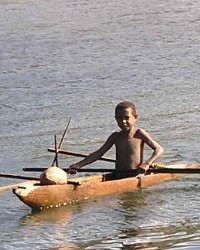Wagawaga, Deamuni in Papua New Guinea

Photo Source:
Anonymous
|
Send Joshua Project a map of this people group.
|
| People Name: | Wagawaga, Deamuni |
| Country: | Papua New Guinea |
| 10/40 Window: | No |
| Population: | 1,200 |
| World Population: | 1,200 |
| Primary Language: | Wagawaga |
| Primary Religion: | Christianity |
| Christian Adherents: | 98.00 % |
| Evangelicals: | 18.00 % |
| Scripture: | Translation Started |
| Ministry Resources: | No |
| Jesus Film: | No |
| Audio Recordings: | Yes |
| People Cluster: | New Guinea |
| Affinity Bloc: | Pacific Islanders |
| Progress Level: |
|
Introduction / History
The Wagawaga people of Papua New Guinea live on the shoreline across the bay from Alotau in Milne Bay Province. Their staple foods include sweet potatoes and yams from their gardens, supplemented with leafy greens from the gardens and fish from the bay. The Wagawaga people also occasionally hunt for animals such as pig and cuscus in the bush. They cook most of their food in coconut milk, which is made by squeezing shredded coconut in water.
Due to the presence of a nearby timber company, many people build their houses of lumber off-cuts that they buy inexpensively from the company. Those that do not use lumber build their houses with wood and palm tree materials. Some people have running water as well. Houses are organized into small family blocks called hamlets, each consisting of only a few houses. Most of the hamlets are located on or near the shore and some are also located further inland. The hamlets together form four different communities: Wagawaga, Gatupa 'ana, Bwadabwada and Dawadawa.
Wagawaga people primarily speak their own vernacular language, also called Wagawaga. Most people speak some English as well, which they learn in school, and many are able to understand neighboring languages to a degree.
What Are Their Beliefs?
Circa 1918 the Kwato church, the largest denomination in the area, was brought to various points on the mainland, including Wagawaga. The churches were non-operational during WWII, at which time people were forced to move out of Wagawaga. After the end of the war, the people moved back and the church reopened.
Many Wagawaga people profess Christianity and some attend church. However, there appears to be a lack of understanding of the gospel among those professing Christianity. There is a need for God's word to be translated into Wagawaga.